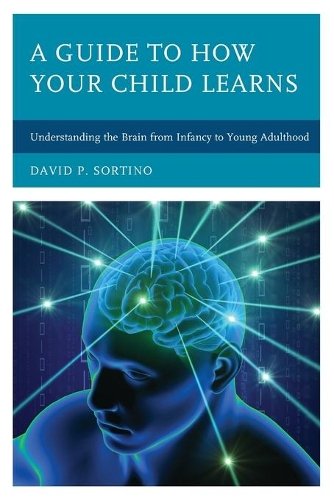
A Guide to How Your Child Learns: Understanding the Brain from Infancy to Young Adulthood
(Paperback)
Available Formats
Publishing Details
A Guide to How Your Child Learns: Understanding the Brain from Infancy to Young Adulthood
By (Author) David P. Sortino
Bloomsbury Publishing PLC
Rowman & Littlefield Publishers
8th November 2017
United States
Classifications
General
Non Fiction
Educational psychology
Parenting, parenthood: advice, topics and issues
Child, developmental and lifespan psychology
370.1523
Physical Properties
Paperback
160
Width 152mm, Height 229mm
Description
In order to create a better learning brain, students must be organized, adaptive, passionate, and secure about learning. Research and follow-up studies of these traits with theoretical knowledge, may suggest why multiple intelligence, child development theory, learning styles, and cognitive development should be included in every teachers playbook. Moreover, one very real challenge with this age group is how to preserve and protect elements of the magical child (fantasy and imagination), while expecting students to successfully transition to school learning, regardless of their ability or interest level. Walk into any school and observe the writing or artwork on the schools walls and you will see an incredible mixture of abilities and imagination. This mixture could be a barometer of your childs learning abilities and actual school success.
Reviews
As a professional in the field of psychiatry, I am very pleased to see that an intelligent book on the subject of nurturing learning brains is available to both parents and teachers. The book, Brain Smart a Better Learning Brain by Dr. David Sortino is a collection of his blog articles on the subject of how to allow ones child, whether a student or family member, to develop a successful learning brain. Most importantly, each article is well supported by research, field studies, and associates publications. Most conveniently, the books articles are arranged into age appropriate sections so that if one has a young teen, he may simply turn to the section dealing with that age group and read relevant information. I highly recommend this book, whether one is a professional in the field of psychology, a teacher, or a parent. His writing is based on personal experience in his experiences as a professional in the fields of educational psychology, special education, and neurofeedback work. Finally, we have a practical, fascinating guide to dealing with current issues in child-rearing and education, especially in regard to creating a successful learning brain for the child. -- Victoria L. Dunckley, Integrative Child, Adolescent & Adult Psychiatry Centre for Life, West Los Angeles
A Guide to How Your Child Learns: Understanding the Brain from Infancy to Young Adulthood is a very accessible guide for parents that covers the childhood landscape from a brain-based perspective. -- Sigfried Othemer, author of "ADD - The 20-Hour Solution"
Dr. David Sortinos book: BRAIN SMART- A Guide To How Your Child Learns: UnderstandingThe Brain From Infancy To Adulthood is a must reader for parents, grand-parents, teachers & paraprofessionals interested in how we learn. He presents up-to-date research on controversial issues affecting student learning at all levels. -- Dagmar Hoheneck-Smith, Child & Adolescent Psychiatrist
Parents and teachers share two great goals: to help children become smart, and to help them become good. Dr. David SortinosA Guide to How Your Child Learns gives us practical, brain-based ways to do both. As a developmental psychologist, I especially appreciated his emphasis on fostering moral growth in childhood and adolescence, the detrimental effects of too much screen time, and alternatives to drugs in treating behavior problems. You may find yourself, as I did, sharing and discussing this books important research findings and recommendations with your grown children and grandchildren. This is knowledge that can improve how we interact, use our time, handle stress, problem-solve, and build a better brainat any stage of human development -- Thomas Lickona, author of "Raising Good Children"
Author Bio
David Sortino holds a Masters Degree in Human Development from Harvard University and a Doctorate in Clinical Psychology from Saybrook University, as well as multiple subject and learning handicapped teaching credentials. He has spent 35 years as a teacher, counselor, director and resource specialist in public and private schools, as well as training teachers and counselors at the university level.
